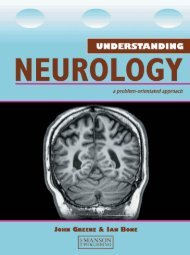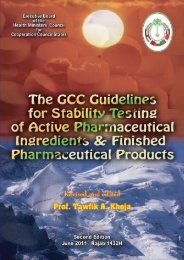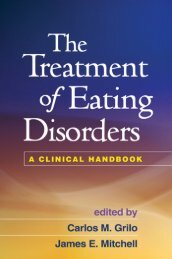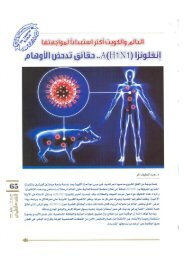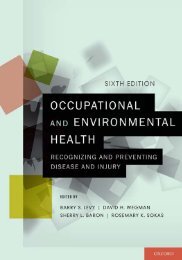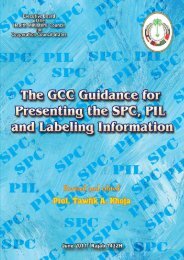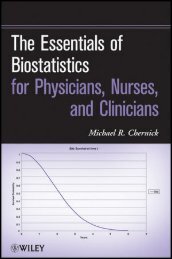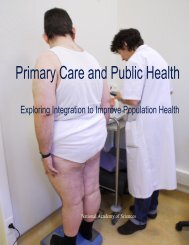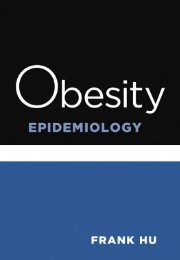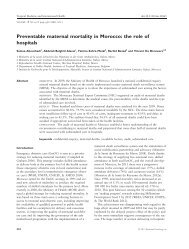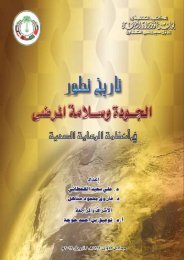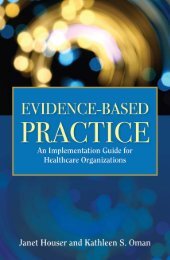NMS Q&A Family Medicine
NMS Q&A Family Medicine
NMS Q&A Family Medicine
- No tags were found...
Create successful ePaper yourself
Turn your PDF publications into a flip-book with our unique Google optimized e-Paper software.
290 <strong>NMS</strong> Q&A <strong>Family</strong> <strong>Medicine</strong>without difficulty. She has unintentionally lost 5 lb(2.27 kg) over the last month and admits that she hashad a relatively depressed appetite. She expressesguilt that maybe if she had been spending more timewatching her sister, her death could have beenavoided. She has had some difficulty initially fallingto sleep, but once she does she sleeps through thenight. She has not noted episodes of inflated selfesteemand has not been going on spending sprees.She has been on no medication (including no streetdrugs), and she has no medical condition to explainthese symptoms. She denies suicidal ideation, hallucinations,or delusions. She has no personal or familyhistory of psychiatric illness. How would you bestclassify her symptoms according to the criteria listedin the fourth edition of the Diagnostic and StatisticalManual of Mental Disorders ?(A) Mixed episode(B) Dysrhythmic disorder(C) Major depressive episode(D) Cyclothymic disorder(E) Adjustment disorder with depressed mood orbereavement6 A 55-year-old woman complains of inability to sleepthrough the night, although she falls off to sleep relativelyeasily. You note that you have seen her for severalfalls at home leading to contusions, and on one occasionfor a laceration of the scalp requiring sutures inrepair. She admits that she has lost the ability to enjoyoccasions that, in the past, were fulfilling to her. Younotice vascular ectasias about the face and upper trunkanteriorly. Laboratory studies show elevated serumglutamic pyruvate transaminase and gamma-glutamyltranspeptidase levels. You suspect she is alcoholic andalso that she is depressed. Which of the following isthe wisest strategic approach to this patient?(A) Because she is female, the chances of her beingboth depressed and alcoholic are slight. Therefore,you should choose one or the other andtreat accordingly.(B) Alcoholic depressed patients fail at abstinenceunless the depression is treated first.(C) The alcoholism should be arrested before thedepression is treated.(D) Suicide is of low probability because patientswith the two diagnoses are less likely to attemptsuicide.(E) Antidepressants are to be avoided in alcoholics,even if their depression persists after months ofabstinence.7 A 35-year-old woman has suffered from rheumatoidarthritis for 3 years and exhibits symptoms ofSjogren syndrome as well. She visits monthly andmore frequently when she runs through pain medication,which is oxycodone, ahead of schedule.Rarely has she pressed for increased dosage and frequencybut complains of dysphoria and sleep problemsthat do not always appear to be related to hernocturnal pain. What are the odds that this patientsuffers from depression?(A) About one in five(B) About one in four(C) About one in three(D) About two in three(E) About three in four8 To which category of antidepressant medicationsdoes each of the following belong: citalopram, escitalopram,and enantiomeer?(A) Tricyclic antidepressants (TCAs)(B) Selective serotonin reuptake inhibitors (SSRIs)(C) Central nervous system stimulants(D) Monoamine oxidase inhibitors (MAOIs)(E) Atypical antidepressants9 Which of the following categories of antidepressantsis associated with the side effects of headache, nausea,tinnitus, insomnia, and akathisia?(A) TCAs(B) SSRIs(C) Central nervous system stimulants(D) MAOIs(E) Atypical antidepressants10 Which of the following classes of antidepressants areassociated with the side effects of anticholinergiceffects, including cardiac dysrhythmias, sedation, andorthostatic hypotension?(A) TCAs(B) SSRIs(C) Central nervous system stimulants(D) MAOIs(E) Atypical antidepressants11 Which of the following classes of antidepressants isassociated with hypertensive crises when combinedwith certain sympathomimetic drugs and meperidineand dextromethorphan when followed by foodswith tyramine?(A) TCAs(B) SSRIs(C) Central nervous system stimulants(D) MAOIs(E) Atypical antidepressants12 With respect to postpartum depression, which of thefollowing statements is correct?



